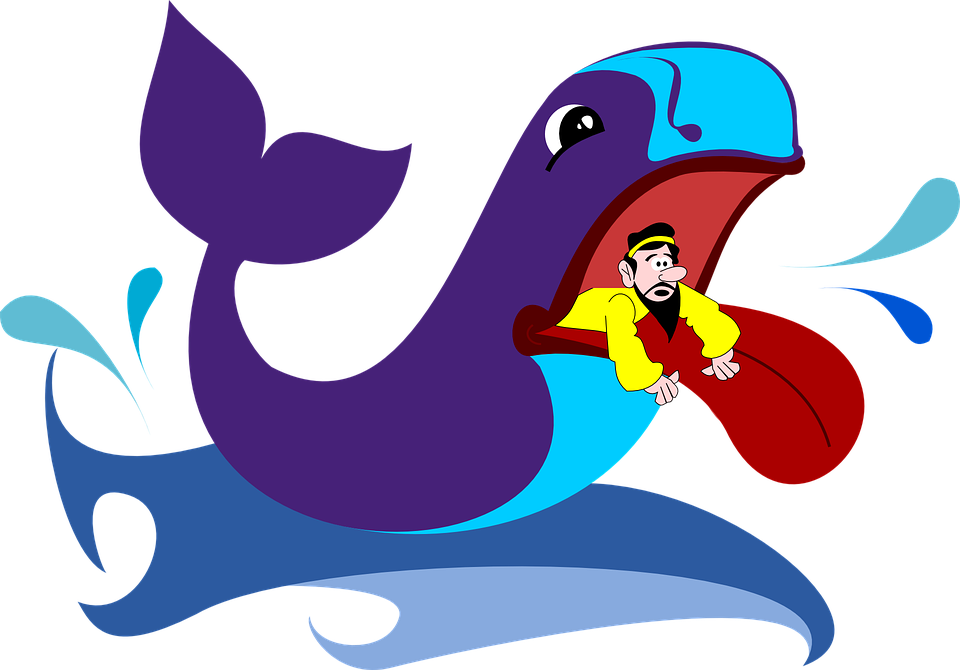In this article we will tell you the story of Jonah and the whale, a story of disobedience and sincere spiritual rebirth embodied in the Bible.

An interesting story for the little ones in the house
Jonah and the Whale: Meaning of the Characters
In the Old Testament, Jonah is presented as a prophet of Yahweh. He is believed to be the author of the book that bears his name, the Book of Jonah, dated to around the XNUMXth century BC.
The book seeks to spread the word of Yahweh through a testimony that confirms his grace, making it clear that the message intended to spread salvation is for all people equally.
The most important task that Yahweh entrusted to Jonah was to preach in the pagan city of Nineveh, with the purpose of proclaiming judgment on it.
As for the whale, it is common to observe within the biblical texts that these representations have various connotations, for example, in some writings this fish appears as a dangerous and threatening figure, while in others it is an opportunity for rebirth.
From the Middle Ages comes the image of an aquatic beast (monstrous) which they called Cetus or Ceto. This great fish was considered seriously, it is said that with the opening of its jaws it attracted innocent fish that it then swallowed.
In some way, this great beastly fish would be the personification of the threats that can be found in the sea, but also, according to what was expressed above, of the devil.
This is evidenced by interpreting the opening of its jaws so that its sweet breath comes out, as a fact similar to the extension of sins such as greed or lust by evil, seeking to attract good men.
Other versions
There are other versions of Ceto's function that point out that he has the ability to hide behind a layer of sand that he himself places on his back, and then accompany this action by remaining completely motionless in the sea.
The objective of the beast is to deceive the sailors so that without realizing what it is really about, they climb on it, believing it to be a great rock ideal for resting. When this happens, Cetus dives into the water to the death of the sailors.
In times of the Middle Ages, these versions were used to exemplify how sin, like the beast, can appear unexpectedly.
Furthermore, these stories were used as a warning of what could happen if men ignored the truly important things and took the path of greed.
A great fish with positive attributes
As mentioned above, the great fish or whale has not always been associated with negative aspects or dangers. In many texts, the belly of this animal is presented as a place of rebirth.
In other words, even when it may seem that the ingested being dies, what really happens is the return of it to the earthly paradise, the womb and center of the world.
It is there where man passes a magical threshold that leads him towards inner reflection, the overcoming of personal tests and doubts framed in silence.
After this event, man is expelled back into the world, being a completely new being in terms of spirit and at peace with himself, a renewed being.
The story of Jonah and the whale
The story begins with the appeal that Yahweh makes to Jonah to travel to Nineveh and make its citizens aware of what would happen to their city due to the sins committed (it would be destroyed in forty days).
Since Jonah was a rebellious prophet, he decided to disobey this order and embark on a journey to Tarshish, a place where the prophet felt he could stay away from Yahweh.
It was from Joppa, the port city of Israel, that Jonah departed for Tarshish; however, Yahweh, due to man's disobedience, gave rise to a great storm.
In the midst of this worrying situation, Jonas chooses to sleep in the hold of the boat while the sailors begin to ask their different gods for help.
It should be noted that these sailors, due to their status as foreigners, were unaware of the existence of Yahweh. The captain of the ship realizes that Jonas is the only man who is not asking his God for help and decides to wake him up to summon him.
The other sailors, in addition to their prayers, also threw objects into the sea as a measure to lighten the load of the boat and face the storm.
As the storm is becoming more intense and does not seem to stop, the sailors decide to try their luck to find out who is responsible for this event.
By Yahweh's designs, the lot fell on Jonah and he, seeing himself cornered, had to confess that he had failed to comply with the order that had been given to him. To avoid the suffering of the other sailors, the prophet asks to be thrown into the sea.
Jonah was thrown into the sea and immediately the fury of the storm ceased, causing those sailors who initially did not know Yahweh to become faithful believers.
El gran pez
Once in the sea, Yahweh makes a whale (the great fish) swallow the prophet, remaining inside for three days and three nights.
During the time he remained in the entrails of the whale, Jonah kept praying to Yahweh, expressing psalms like the following that refer to his intercession in the midst of the prophet's anguish and despair.
Jonah promised to fulfill what had been previously assigned to him and recognized the saving power of his God. The next thing that happens is that Yahweh orders the fish to vomit Jonah (on dry land) thus marking the rebirth of the prophet.
Jonah arrives at Nineveh
After being expelled from the belly of the whale, Jonah is ordered to go to Nineveh for the second time. On this occasion, the prophet accepts without question and moves to the city to broadcast the message.
Said message is nothing more than the announcement that in forty days the city would be demolished. Immediately the inhabitants of Nineveh began to raise prayers to Yahweh.
Similarly, the king of the city orders all citizens to do penance. Thus all the inhabitants cling to the belief in the power of God.
Moved by the actions and the repentance of the population, Yahweh decides to forgive the city and therefore its inhabitants for the sins committed.
When the forty days passed and he realized that God had had mercy on the people of Nineveh, an enraged Jonah decided to leave the city and even asked Yahweh to take his life.
Jonah and the Whale Story Lesson
In order to make Jonah understand the purpose of his action, Yahweh makes a leafy plant grow that provides the prophet with a shadow. However, the joy of the prophet is short-lived, at night a worm causes the plant to dry up.
After being exposed to the harsh wind and the incandescent sun, Jonas asks to die again, stating that he would rather run with this fate than continue living under those conditions.
Thanks to these events, God gave Jonah the most important lesson of mercy of his entire life. The rebellious prophet pitied a plant that he did not cultivate, but that appeared one night and simply disappeared another.
This example was taken by Yahweh so that Jonah would understand that just as he had taken pity on the plant, in the same way his God had done with Nineveh.
Yahweh asked Jonah how he could not feel any kind of pity for this city that had a population of almost one hundred and thirty thousand inhabitants and a large number of animals.
Final reflection
As we can see, this is a story that initially shows the disobedience of a son to his father's orders, but later shows the mercy of the father who decides to forgive his son.
The book of Jonah is a different text from the other members of the Bible, this is because in this writing the protagonist is the prophet above his prophecies.
The story can be interpreted as a representation of the kind God and the Jewish people of the time, as well as the humane behavior of the settlers.
Nineveh was a city known for negative aspects and for not being believers in Yahweh, these factors influenced Jonah's attitude before the idea of transmitting a message in that city.
One of the elements that is touched on in this story is the fact that somehow the prophet was displeased with God for offering mercy to this people.
Was the attitude of the prophet right?
Before judging Jonah, it is good to consider that his reaction is totally understandable if analyzed from his perspective, that is, the prophet knew he belonged to the chosen people, therefore everything that was contrary to Yahweh was not acceptable.
However, this childish attitude shown by Jonas leads him to learn a great life lesson. A lesson that led him to the belly of a whale, where he realized his mistake, embarking on a new path.
Path that led him to rebirth, the rebirth of man in spirit and consciousness, as well as the confirmation of the universal power of God who makes no difference between his children.
Finally, inquire about other biblical texts that contribute to your rapprochement with God, for this we invite you to click on the following link, Biblical texts for children.

